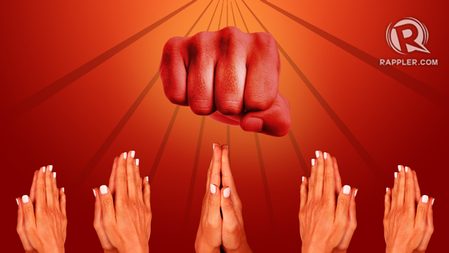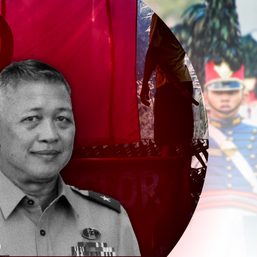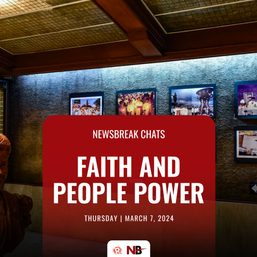SUMMARY
This is AI generated summarization, which may have errors. For context, always refer to the full article.
![[OPINION] Christianity in a time of authoritarian nostalgia](https://www.rappler.com/tachyon/2023/02/Christianity-and-authoritarian-2.jpg)
Duterte’s presidency is now over, and Marcos’s dictatorship has long ended.
But neither provides an assurance that authoritarianism will never return. If at all, our recent history is a haunting reminder that Philippine democracy’s vulnerability is not so much in forgetting as it is in longing — authoritarian nostalgia.
In other words, authoritarian nostalgia may be about the imagined past, but it is about the future, too. The latter might even outweigh the former. In the words of Bobby Benedicto, the “authoritarian past may have only recently emerged as a widespread object of mass nostalgia, but, in a sense, the Filipino people have long been anticipating Marcos’s return.”
This is why fact-checking can only do so much in putting an end to the nostalgia.
It does not matter whether Filipinos (truly) experienced a reality of greatness at one point in time. Couched in a language of discipline, unity, and self-sufficiency, this fantasy has proven to be compelling.
I will grant that Philippine society is where it is as a result of historical erasure, a longstanding project spearheaded by the Marcoses themselves through their distortionist narrative. But another layer needs to be acknowledged too: that many people can embrace strongman rule and do believe that this is good for democracy, all in the name of peace and order.
The religiosity of authoritarian nostalgia
In a previous piece, I have written about authoritarian nostalgia and its pervasiveness among Filipinos. I invite readers to take a look at it.
This time I turn my attention to the role of religion in confronting authoritarian nostalgia.
My reason is simple. If authoritarian nostalgia is premised on fantasy-making, there’s only so much that facts can achieve. This is because fact-checking, while crucial, is unable to speak to the deeply religious character of authoritarian nostalgia.
At its core, authoritarian nostalgia has a redemptive narrative. It believes that the Philippines can once again regain its greatness, lost when Filipinos took it upon themselves to assert their freedom in 1986.
Thus, it deliberately negates the achievements of EDSA 1, which marked a return to a democratic system, however flawed it might have been.
Like the original sin committed by Adam and Eve, that cry for freedom in EDSA 1, in the eyes of authoritarian nostalgia, led Filipinos down the road to perdition.
For those who believed in him, Duterte knew the price that had to be paid for the sins of the fathers: blood. And true enough, much blood was shed throughout his presidency.
And when Bongbong Marcos declared his candidacy, he declared that his would be a “unifying leadership,” evading the atrocities of martial law altogether.
There is, in other words, a redemptive arc, however vulgar, to the narrative of authoritarian nostalgia. The father was “killed,” the family assailed, and now the son is coming back to life. Soon, we shall all witness the restoration of peace, order, and national greatness.
On public theology
Authoritarian nostalgia’s religious character calls for a religious response. It is for this reason that I subscribe to public theology.
Couched in the Christian language, but possible too in other faith traditions, it calls for a dialogue within the faith community and with the wider society.
But make no mistake. Public theology is neither pontification nor preaching to the public. It’s not just about quoting a Bible verse, as might be the case whenever religious people express their disagreement. Often, whenever that happens, the conversation has ended before it even started.
Instead, public theology calls for honest conversations about issues that affect our society. Ultimately, it is oriented towards the common good, no matter how difficult or contentious it might be.
In this sense, public theology is “theology that talks with society, not just to society.”
Transformative
If done well, public theology is transformative.
First, it demands that people of faith listen to one another. It eschews the knee-jerk use of doctrine.
Take, for example, the commandment “Thou shalt not kill.” While I do understand the message, invoking it fails to allay people’s fears in the face of criminality.
Filled with anxiety, many people bought into Duterte’s war on drugs, believing that it was necessary. His uncompromising statements against drug users made them feel safe at night.
In effect, invoking “Thou shalt not kill” is unable to recognize the moral battle at play. In this moral battle, the one being accused of murder — Duterte — was for his believers, the defender of life.
There is, therefore, in authoritarian nostalgia an underlying moral or religious perspective that needs to be acknowledged.
Two, public theology dares to cast a vision.
If the premise of public theology is that it listens to the public, then the public is its very resource. The faith community — a shorthand I use to refer to ministers and the lay — needs to recognize the aspirations of ordinary Filipinos.
Ambisyon 2040 is a good document to start with. It is, after all, based on a national survey and focus group discussions with Filipinos from all walks of life. According to this document, what the good life looks like for the Filipino is clear: matatag, maginhawa, panatag.
These are virtues that revolve around relationships, human security, and equitable access to basic needs. Hijiacked by authoritarian nostalgia, these virtues must now be reclaimed by people of goodwill.
This calls for a collective effort to craft a compelling vision of the future, redeemed from the seduction of authoritarian nostalgia.
The first call
But the work of public theology is not easy. The religious voice often turns people off.
From the elections last year to the SOGIE bill this year, the religious sector tends to be too “noisy.” Someone I interviewed years ago minced no words: “self-righteous.”
At the same time, to listen is an arduous task. The political divisions in Philippine society are to be found right in our kinships and even our own religious spaces.
And so perhaps the first call of public theology is to get the faith community to come to its senses.
Public theology relies, after all, on collective discernment. It resists any form of pontification or monopolistic claim to truth, the kind of zealousness one easily finds in fundamentalism and certainly in authoritarian nostalgia.
Thus, in a spirit of dialogue, public theology seeks to understand other people instead of calling them names. In solidarity with one another, it demands the relentless pursuit of equality, justice, and dignity.
By doing so, faith may once again reimagine the good news and proclaim it with compassion. Not because of the facts it holds, but the hope it offers. – Rappler.com
Jayeel Cornelio, PhD (TOYM 2021) is a sociologist of religion and the Associate Dean for Research and Creative Work at the Ateneo de Manila University. This piece is derived from his chapter in the recently published Martial Law in the Philippines: Lessons and Legacies 1972-2022 (edited by Edilberto C. De Jesus and Ivyrose Baysic, Ateneo de Manila University Press). Follow Dr. Cornelio on Twitter @jayeel_cornelio.
Add a comment
How does this make you feel?

![[Newspoint] A Freedom Week joke](https://www.rappler.com/tachyon/2024/06/20240614-Filipino-Week-joke-1.jpg?resize=257%2C257&crop_strategy=attention)



![[Bodymind] Forgiveness, Enrile, and Bongbong Marcos Jr.](https://www.rappler.com/tachyon/2024/03/forgiveness-enrile-bongbong-march-6-2024.jpg?resize=257%2C257&crop=411px%2C0px%2C1080px%2C1080px)

![[The Wide Shot] Peace be with China](https://www.rappler.com/tachyon/2024/07/wideshot-wps-catholic-church.jpg?resize=257%2C257&crop=311px%2C0px%2C720px%2C720px)
![[OPINION] A critique of the CBCP pastoral statement on divorce](https://www.rappler.com/tachyon/2024/07/TL-cbcp-divorce-statement-july-19-2024.jpg?resize=257%2C257&crop=285px%2C0px%2C722px%2C720px)
![[REFLECTION] Mary, Mother of the West Philippine Sea](https://www.rappler.com/tachyon/2024/07/may-mother-west-ph-sea-july-19-2024.jpg?resize=257%2C257&crop=293px%2C0px%2C751px%2C750px)
![[OPINION] Ignorance and prejudice](https://www.rappler.com/tachyon/2024/07/tl-ignorance-and-prejujdice.jpg?resize=257%2C257&crop_strategy=attention)
There are no comments yet. Add your comment to start the conversation.